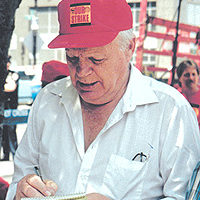Growing opposition to a U.S. war against Iraq was clearly in evidence on March 10 when MoveOn.org, Win Without War, the American Friends Service Committee (AFSC) and Artists United to Win Without War delivered petitions bearing more than a million names from 200 countries to the United Nations Security Council. According to MoveOn.org, the signatures were gathered in only five days.
Pointing to the world’s two superpowers – the United States and world public opinion – Tom Andrews, national director of Win Without War, called upon the “second superpower to rise around the world, to let your voices be heard … the alternative is catastrophic.”
“We launched the campaign to illustrate the extent of worldwide support for a peaceful solution to the Iraq crisis. Hopefully the members of the council who have not yet made up their mind will take note of that sentiment,” Peter Lems, who works with the AFSC Iraq Program, told the World in a March 11 interview.
Lems said petitions were also delivered to the presidents of Mexico, Chile and Angola, as well as to the Mexican consulate in Chicago.
“These countries are under unimaginable pressure. They all remember that the U.S. cut off all aid to Yemen when that country voted against the Gulf War in 1990,” he said.
Lems credited world public opinion with forcing the United States to postpone a vote on its resolution setting a March 17 deadline for war with Iraq.
“Every day we postpone war gives us another chance to prevent war altogether. The only reason for the delay is because, as of March 11 at least, the U.S. doesn’t have the nine votes needed for war to be sanctioned by the UN.”
Debate in the Security Council, which met on March 7, also reflected the overwhelming desire of the world’s people for a peaceful solution to the Iraq crisis. Only Bulgaria supported a resolution authored by the U.S., England and Spain authorizing military action as soon as March 17.
As was the case in previous debate, French Foreign Minister Dominique de Villepin led the opposition to war. “To those who believe that war would be the quickest way of disarming Iraq, I can reply that it will drive wedges and create wounds that will be long in healing. And how many victims will it cause?” de Villepin asked as he challenged the U.S. to reveal “the other objectives of a war. Is it a matter of regime change in Baghdad?” he demanded.
De Villepin said the military agenda “must not dictate” the calendar of inspections. “We agree to timetables and to an accelerated calendar [of inspections]. But we cannot accept an ultimatum as long as the inspectors are reporting cooperation. That would mean war.”
In their reports to the council, UN weapons inspectors Hans Blix and Mohamad ElBaradei reported increased cooperation by Iraqi authorities. Blix said Iraq’s destruction of its Al Samoud 2 missiles constitutes a “substantial measure of disarmament. We are not watching the destruction of toothpicks. Lethal weapons are being destroyed.”
Blix said it would not “take years, nor weeks, but months,” for inspectors to complete their work.
ElBaradei said the International Atomic Energy Agency found no evidence to support reports that Iraq tried to buy uranium from Niger. He said documents substantiating the charge were fraudulent.
President Bush dismissed the destruction of the Samoud missiles as “a public show of producing and destroying a few prohibited missiles,” and argued anew that American intelligence – which the White House has declined to release – “shows that even as he is destroying these few missiles, he has ordered the continued production of the very same type of missiles.”
Joschka Fischer, foreign minister of Germany, reminded his colleagues of the “endless suffering” and “catastrophic humanitarian consequences” war would bring. “Are we really in a situation that absolutely necessitates the very last resort? I think not, because the peaceful means are far from exhausted,” he said.
Fischer’s concerns were echoed by Igor Ivanov, Russian foreign minister, who asked, “Is it reasonable to halt the inspections and in that way eliminate the momentum gained in the process of Iraq’s disarmament?” He said the UN has enough resolutions and now needs “active support of the inspectors in carrying out their tasks.”
Ivanov warned that unilateral military action by the U.S. would violate the UN Charter and added: “When the Charter is violated, the Security Council must gather, discuss the situation and make the corresponding decisions.”
While Bush has insisted he does not need UN approval, failure to get a majority in the Council behind the proposed deadline will strengthen anti-war movements around the world. It would also weaken British Prime Minister Tony Blair who desperately seeks a Security Council resolution to cloak his abject surrender to Bush policies.
President Jimmy Carter and Adolfo Perez Esquivel, both winners of the Nobel Peace Prize, also spoke out against war last week, with Esquivel warning that war on Iraq would “open Pandora’s box, threatening to set free the demons of death and destruction.”
In an article in The New York Times Carter said the Bush administration has instituted “profound changes” in American foreign policy, that reverse “bipartisan commitments that for more than two centuries have earned our nation greatness. These commitments have been predicated on basic religious principles, respect for international law, and alliances that resulted in wise decisions and mutual restraint. Our apparent determination to launch a war against Iraq, without international support, is a violation of these premises.”
Tony Pecinovsky (tonypec@pww.org) contributed to this article.
The author can be reached at fgab708@aol.com
PDF version of ‘World says No to war’












Comments